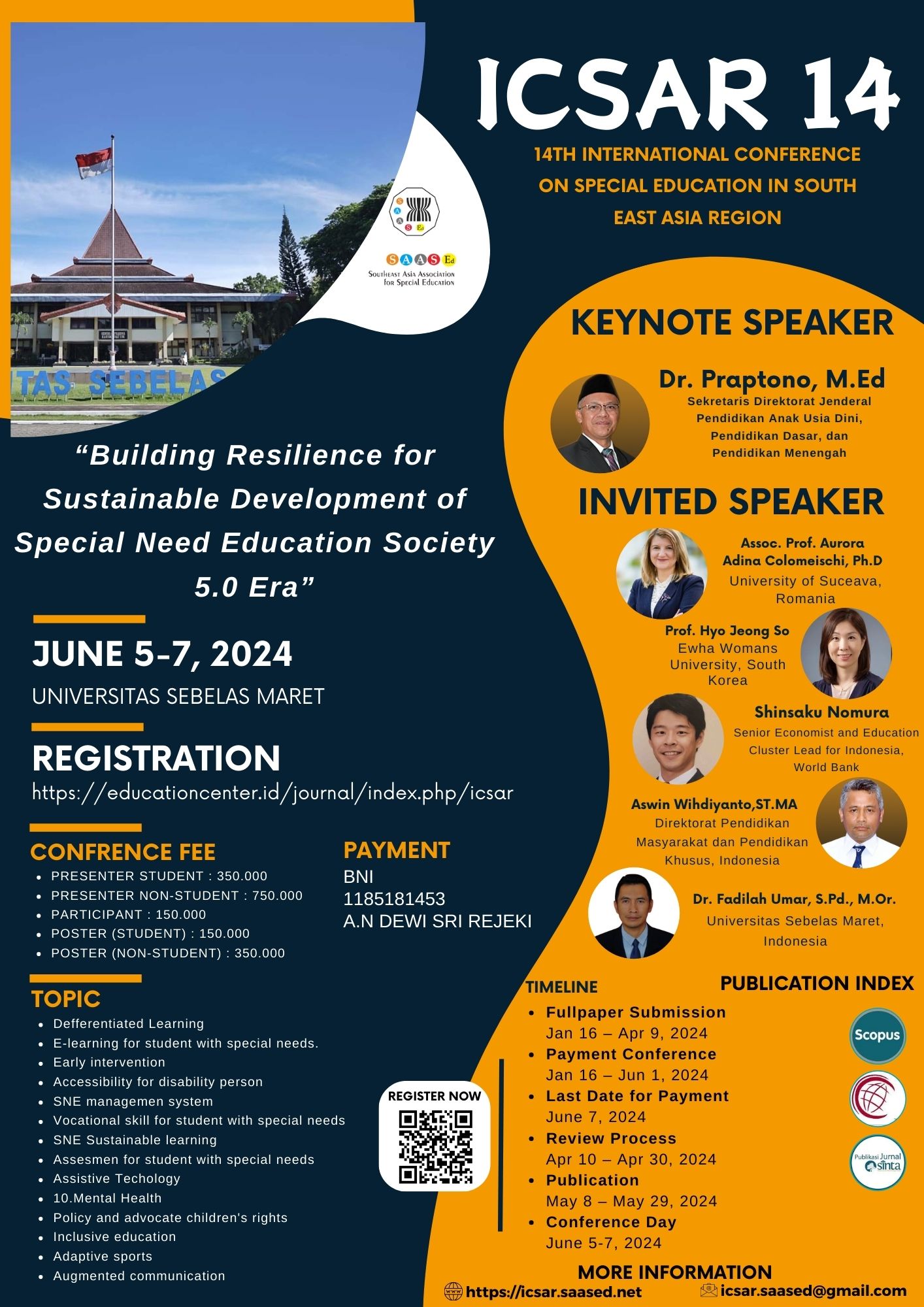Analysis of Knowledge and Skills among Special Education Teachers in Inclusive Schools in Indonesia
DOI:
https://doi.org/10.57142/picsar.v3i1.573Keywords:
Knowledge, Skills, Special Education TeacherAbstract
This research examined the knowledge and skills of special education teachers within the context of inclusive education in Indonesia. Employing a quantitative survey approach, the study aimed to determine whether a statistically significant disparity existed between these two variables. The data collection technique utilized included knowledge tests and performance assessments, involving 637 participants from 26 districts/cities. The data analysis technique employed was the t-test using SPSS. The research findings indicated that the mean knowledge score (51.85) was lower than the mean skill score (73.90). The t-test result showed a value of -29.87 with p-value <0.05, indicating a significant difference between the knowledge and skill scores. Several factors contributed to the higher skill scores, including limited access to specialized training and professional development, curriculum structures prioritizing skill-based coursework, and the unique demands of inclusive education settings.
References
Adaka, T. A., Adigun, O. T., Lalu, J., & Mngomezulu, T. P. (2022). Effect of mentorship on regular teachers’ selfefficacy towards implementation of inclusive education at basic education level. Specijalna Edukacija i Rehabilitacija, 21(4), 233–253, DOI: 10.5937/specedreh21-37192
Anthony, G., Hunter, J., & Hunter, R. (2015). Prospective teachers development of adaptive expertise. Teaching and Teacher Education, 49, 108–117, DOI: 10.1016/j.tate.2015.03.010
Beach, D., & Bagley, C. (2013). Changing professional discourses in teacher education policy back towards a training paradigm: a comparative study. European Journal of Teacher Education, 36(4), 379–392. DOI:10.1080/02619768.2013.815162
Central Java Provincial Regulation. No. 4 Year 2012 on Education Implementation.
Kristiana, I. F., & Hendriani, W. (2018). Teaching Efficacy in Inclusive Education (IE) in Indonesia and other Asia, Developing Countries: a Systematic Review. Journal of Education and Learning (EduLearn), 12(2), 166–171. DOI: 10.11591/edulearn.v12i2.7150
Maula, I., Leonardo Sari, A., Sisfiani Sarimin, D., S Rondonuwu, R. H. (2023). Pendidikan untuk Pemerataan Pembangunan: Memperjuangkan Hak Semua Anak [Educating for Development Equity: Advocating for the Rights of All Children]. Journal on Education, 05(04), 13153–13165. Retrieved from http://jonedu.org/index.php/joe
Mihajlovic, C. (2020). Special educators’ perceptions of their role in inclusive education: A case study in Finland. Journal of Pedagogical Research, 4(2), 83–97, DOI: 10.33902/JPR.2020060179
Minister of Education and Culture Regulation. No. 70 Year 2009 on Inclusive Education for Students with Disabilities and Special Intelligence and/or Talents.
Mintz, J. (2019). A comparative study of the impact of enhanced input on inclusion at pre-service and induction phases on the self-efficacy of beginning teachers to work effectively with children with special educational needs. British Educational Research Journal, 45(2), 254–274, DOI: 10.1002/berj.3486
Neilson, W., & Brink, A. (2008). The importance of educating student teachers in inclusive education. A disability perspective. Kairaranga, 9(2), 16–21. DOI: 10.54322/kairaranga.v9i2.122
Nilsson, M. Z. (2017). Practical and Theoretical Knowledge in Contrast : Teacher Educators ´ Discursive Positions. Australian Journal Of Teacher Education, 42(8). Retrieved from http://ro.ecu.edu.au/ajte/vol42/iss8/3%0D
Nina, F. C. K., Silva, C. S. S., & Pontes, R. A. F. (2020). Transcultural adaptation of The Teacher Efficacy for Inclusive Practices (TEIP): Brazilian version. Ciencias Psicológicas January, 14(1), e-2175, DOI: 10.22235/cp.v14i1.2175
Rahayu, N. P., Nugroho, P. J., & Berliani, T. (2019). Pembinaan Profesional Guru Sekolah Dasar Daerah Terpencil ["Professional Development for Primary School Teachers in Remote Areas"]. Equity in Education Journal, 1(1), 62-72. Retrieved from https://e-journal.upr.ac.id/index.php/eej/article/view/1554
Republic of Indonesia. Law No. 20 Year 2003 on National Education System.
Schwan, A., Wold, C., Moon, A., & Neville, A. (2020). Mentor and New Teacher Self-Perceptions Regarding the Effectiveness of a Statewide Mentoring Program. Critical Questions in Education, 11(3), 190–207. Retrieved from https://files.eric.ed.gov/fulltext/EJ1287181.pdf
Stremmel, A. J., Burns, J., Nganga, C., & Bertolini, K. (2015). Countering the Essentialized Discourse of Teacher Education. Journal of Early Childhood Teacher Education, 36(2), 156–174, DOI: 10.1080/10901027.2015.1030522
Downloads
Published
How to Cite
Issue
Section
Categories
License
Copyright (c) 2024 Proceeding of International Conference on Special Education in South East Asia Region

This work is licensed under a Creative Commons Attribution 4.0 International License.





